|
|
|
Sort Order |
|
|
|
Items / Page
|
|
|
|
|
|
|
| Srl | Item |
| 1 |
ID:
116127
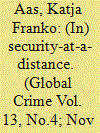

|
|
|
|
|
| Publication |
2012.
|
| Summary/Abstract |
The article examines the progressive de-bounding of social risks and the blurring boundaries between internal and external notions of security. Contemporary forms of cross-border connectivity bring to our attention the renewed importance of analysing distance (physical, social and other) in criminology. Globalising processes significantly expand the scale and scope of social interaction, including violent conflict and crime control and security strategies, by offering social agents a possibility of acting from the point of 'strategic globality'. The article outlines an emerging landscape of 'security at a distance', where previously local and national phenomena are transformed by new forms of transnational connectivity, risk and movement. It suggests that, through the emerging forms of globalism, criminal justice is plugging into trans-border circuits of circulation of people, forms of knowledge and social and political action, where, ultimately, crime control can become an export and war can be, metaphorically, seen as an import.
|
|
|
|
|
|
|
|
|
|
|
|
|
|
|
|
| 2 |
ID:
116131
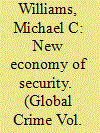

|
|
|
|
|
| Publication |
2012.
|
| Summary/Abstract |
New security dynamics present significant theoretical and empirical challenges. This article suggests that Pierre Bourdieu's ideas about an 'economics of practice' provides a fruitful means for exploring and explaining many of these transformations.
|
|
|
|
|
|
|
|
|
|
|
|
|
|
|
|
| 3 |
ID:
116130
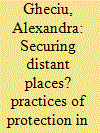

|
|
|
|
|
| Publication |
2012.
|
| Summary/Abstract |
This article explores the dynamics and implications of practices of protection enacted within the framework of the UN-sponsored International Security Assistance Force (ISAF) in Afghanistan. It examines the ways in which those practices challenge established categories in the field of security, and discusses the problems and dilemmas they generate. The article demonstrates that the role played by North Atlantic Treaty Organization - as the lead actor in ISAF - reflects the Alliance's reconceptualisation of the relevant space of security. An analysis of security practices employed by ISAF in Afghanistan reveals that, in spite of statements that stress the unique situation of stabilisation and reconstruction in Afghanistan, ISAF's dual emphasis on inclusion/exclusion (i.e. defeating radical Taliban and Al-Qaeda fighters while also winning the hearts and minds of the other Afghans) echoes in interesting ways of colonial practices of counter-insurgency. Conceptually, one of the most interesting features of ISAF's security practices has been a blurring of multiple boundaries that have long been at the heart of thinking about international politics: domestic/international, military/policing and public/private actors. By shedding light on that process of blurring boundaries, this article provides further evidence in support of the claim made in this special issue: that we are now living in a world in which many of the distinctions that once appeared to be clearly defined and fairly rigid are fast breaking down.
|
|
|
|
|
|
|
|
|
|
|
|
|
|
|
|
| 4 |
ID:
116129
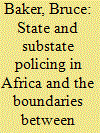

|
|
|
|
|
| Publication |
2012.
|
| Summary/Abstract |
Following an overview of the diverse substate policing sector in Africa and the main changes taking place within it, there follows an examination of the complex and dynamic boundaries between state and substate. The boundaries are at times imagined. States are constantly engaged in constructing an image of policing and its boundaries that does not correspond with reality. The boundaries are also permeable: authority, activities and agents pass across the boundary. State and substate are not clearly separated. Such is the geographical overlapping of policing agencies that Africans commonly move into and out of spheres of policing providers. The boundaries are also shifting. Boundaries between public and private, between legal and illegal and between state and substate are subject to ongoing power struggles and negotiation that result in change and reconstruction. The article concludes with some remarks about the potential and risks of utilising substate policing agencies.
|
|
|
|
|
|
|
|
|
|
|
|
|
|
|
|
| 5 |
ID:
116128
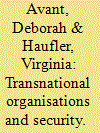

|
|
|
|
|
| Publication |
2012.
|
| Summary/Abstract |
The fields of international relations and criminology analyse security from different directions, but both have had a dominant focus on states and state agencies until recently. Even as they looked at a wider range of actors as security providers, an important category of security actors has not been analysed so far - 'non-violent' transnational organisations. Transnational non-governmental organisations (NGOs) and transnational corporations (TNCs) are not security organisations per se, but the strategies these transnational non-state actors pursue in response to violence affect security for both themselves and the societies in which they operate. We argue here that security at the local level is an outcome of interactions among diverse actors including transnational organisations and call for a research agenda focused on how transnational actors choose their response to insecurity and how those choices affect security governance.
|
|
|
|
|
|
|
|
|
|
|
|
|
|
|
|
| 6 |
ID:
116126
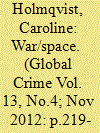

|
|
|
|
|
| Publication |
2012.
|
| Summary/Abstract |
Understandings of war - its shape, form, character and content - are conditioned by conceptualisations and narratives of social and political space. As such, the history of writing on war is also a history of spatiality, expressed through a particular circumstance and practice. Through analysis of early modern conceptualisations of space, politics and war, this article considers the shift in political spatiality associated with the demise of modern linear spatiality that firmly established the territorial state as site of politics and war. The central argument of this article is that contemporary accounts of war reveal a political spatiality in flux coupled with an insistence on the global, such that many accounts of war neglect its political content. Three key accounts of contemporary war are engaged: liberal discourses of war as 'policing'; accounts of war as 'biopolitical empire'; and discourses of war as 'risk management' - all found, in different ways and collectively, to disregard the political confrontation that war necessarily entails.
|
|
|
|
|
|
|
|
|
|
|
|
|
|
|
|
|
|
|
|
|